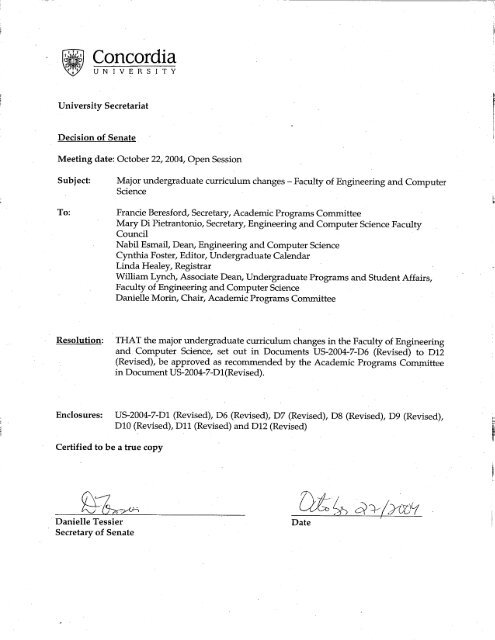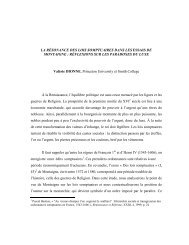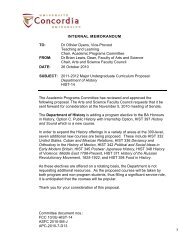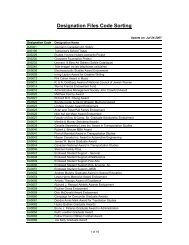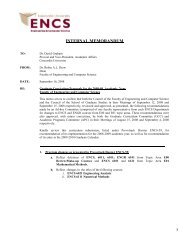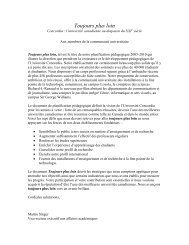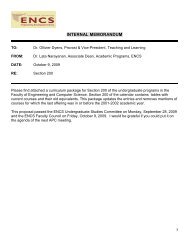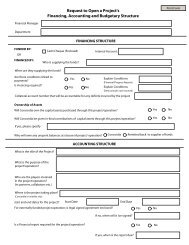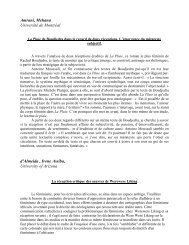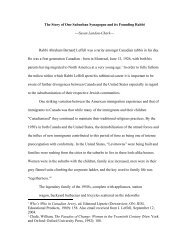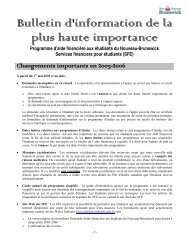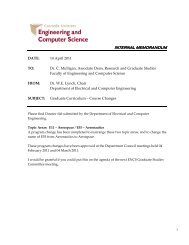interoffice memorandum
interoffice memorandum
interoffice memorandum
Create successful ePaper yourself
Turn your PDF publications into a flip-book with our unique Google optimized e-Paper software.
INTEROFFICE MEMORANDUMTO:FROM:CC:Dr. M. Singer, Provost and Vice PresidentDr. W.E. Lynch, Associate Dean, Undergraduate Programs and StudentAcademic ServicesDr. N. Esmail, Dean, Faculty of Engineering and Computer ScienceSUBJECT:Curriculum Changes for 2005-06 Calendar – Co-op ProgramsDATE: October 18, 2004These changes have now passed by the Faculty Council of the Faculty ofEngineering and Computer Science on October 15, 2004. There were nochanges from the previous document submittedPlease put these on the agenda for the next Senate meeting.5
INTEROFFICE MEMORANDUMTO:FROM:CC:Dr. M. Singer, Provost and Vice PresidentDr. W.E. Lynch, Associate Dean, Undergraduate Programs and StudentAcademic ServicesDr. N. Esmail, Dean, Faculty of Engineering and Computer ScienceSUBJECT:Curriculum Changes for 2005-06 Calendar – Co-op ProgramsDATE: October 13, 2004These changes were passed by the Faculty of Engineering and ComputerScience Undergraduate Studies Curriculum Committee on September 1, 2004and by the Academic Programs Committee on September 23, 2004.These changes will be presented for passage at the Faculty Council of theFaculty of Engineering and Computer Science scheduled for October 15, 2004.Could you please put these on the agenda for the next Senate meeting,contingent on them passing our Faculty Council on October 15?The main benefit of co-op is that it enhances the educational experience forstudents. It gives them direct experience of the professional world they areseeking to join and the expectations that the professional world will hold of them.It also helps to motivate learning in the material that they are taking at school.The Faculty is determined to allow a larger class of our students to have theopportunity to experience co-op.Currently co-op in the Faculty is built for elite students. In particular co-opstudents in engineering programs are required to take the entire regular programthat would normally be done in eight academic terms in seven. This allows for 4work terms with the student finishing in the normal four academic years. In orderto make co-op more accessible, the Faculty with this change is moving to eightacademic terms for co-op students along with three work terms. The three workterms falls within the requirements that all co-op programs must meet.Among less substantial changes made here, the Faculty is directing students to aweb site rather than a calendar section in regards to the co-op work terms. This6
will be more efficient in laying out transition measures for students as this changeis phased in.Also the Faculty is directing students to the Student Academic Services (SAS)Unit rather than the department Co-op Directors. With SAS as the first contactpoint, Co-op Directors will be relieved of some routine work.The Co-op sections in each department are also being removed. This material isessentially the same for all programs and is informational in nature rather thanregulatory. This information will be given in the web page mentioned above.7
PROGRAM AND COURSES CHANGE FORMS FOR DOCUMENT: ENCS-3 VERSION: 4PROGRAM CHANGE: Section 71.10.8Proposed [X] Undergraduate or [ ] Graduate Curriculum changesCalendar for academic year: 2005/2006Implementation Month/year: January 2005Faculty/School:Engineering and Computer ScienceDepartment:All Engineering and Computer ScienceProgram:All Engineering and Computer ScienceDegree:BEng and BCompScCalendar Section/Graduate Page Number:71.10.8Type of Change:[X] Editorial[ ] New Program[ ] Requirements [ ] Regulations [ ] Program DeletionPresent Text (from 2004/2005) calendar71.10.8 The Co-operativeFormatA limited number of high ranking students entering the first yearof the regular program leading to the BCompSc degree and the BEngdegree are permitted to undertake their studies in the co-operativeformat in conjunction with the Institute for Co-operativeEducation. See §24.The academic content is identical to that of theregular programs; however, in order to continue their studies inthe co-operative format in the Faculty of Engineering and ComputerScience, or to graduate from one of its programs as Members of theInstitute for Co-operative Education, students must satisfy thefollowing conditions:(i) maintain an annual grade point average (WGPA)* of at least 2.70in their program after their first year of study with no singleterm below 2.50;(ii) be assigned a grade of pass or pass with distinction for eachof the four work-term courses (CWTE or CWTC). Under certainconditions, a student may be placed on co-op probation status. Fordetails, refer to §24;(iii) remain in their designated work-study sequence. Anydeviations must have prior approval by the director of theInstitute for Co-operative Education in consultation with the co-opprogram director.For additional information, please refer to §24.*The WGPA is calculated over all courses in the program in themanner described in §16.3.10.Regulations for Work TermsProposed Text71.10.8 The Co-operativeFormatA limited number of high ranking students entering the first yearof the regular program leading to the BCompSc degree and the BEngdegree are permitted to undertake their studies in the co-operativeformat in conjunction with the Institute for Co-operativeEducation. See §24. The academic content is identical to that ofthe regular programs; however, in order to continue their studiesin the co-operative format in the Faculty of Engineering andComputer Science, or to graduate from one of its programs asMembers of the Institute for Co-operative Education, students mustsatisfy the following conditions:(i) maintain an annual grade point average (WGPA)* of at least 2.70in their program after their first year of study with no singleterm below 2.50;(ii) be assigned a grade of pass or pass with distinction for eachof the three work-term courses (CWTE or CWTC). Under certainconditions, a student may be placed on co-op probation status. Fordetails, refer to §24;(iii) remain in their designated work-study sequence. Anydeviations must have prior approval by the director of theInstitute for Co-operative Education in consultation with StudentAcademic Services.For additional information, please refer to §24.*The WGPA is calculated over all courses in the program in themanner described in §16.3.10.8Regulations for Work TermsD1
1. Successful completion of the work terms shown in the Co-opSchedule indicated in §24 is a prerequisite for graduation as amember of the Institute for Co-operative Education.2. Work-term job descriptions are screened by the co-opcoordinator. Only jobs approved by the Institute for Co-operativeEducation will be accepted as being suitable for the work-termrequirements.3. Work-term jobs are full-time employment normally for a minimumof 12 consecutive weeks(14 to 16 weeks preferably).4. A work-term report must be submitted each work term on a subjectrelated to the student's employment. This report must be submittedto the Institute for Co-operative Education on or before thedeadline shown in §24. Grammar and content of work-term reports areevaluated by the Institute for Co-operative Education and thetechnical aspects are evaluated by the co-opprogram directorresponsible. Evidence of the student's ability to gather materialrelating to the job, analyse it effectively, and present it in aclear, logical, and concise form is required in the report.5. The communication component as required in Engineering WorkTerms II and IV consists of an oral presentation on a technicalsubject or engineering task taken from the student's workenvironment. The presentation will be given on campus in a formalsetting after students have returned to their study term. A writtensummary is also required. Guidelines for the preparation of thisoral presentation are provided in the Co-op Student Handbook.6. Work terms will be evaluated for satisfactory completion.Assessment is based upon the employer evaluation of performance,the work-term report and communication component which togetherconstitute the job performance as related to the whole work term.Students must pass all required components. The grade of pass withdistinction, pass, or failure will be assigned to each of thework-term courses. A failing grade will result in the student'swithdrawal from theInstitute for Co-operative Education.For the description of the work terms, please refer to §71.60.1 forBEng and §71.70.12 for BCompSc.1. Successful completion of the work terms shown in the Co-opSchedule indicated in §24 is aprerequisite for graduation as amember of the Institute for Co-operative Education.2. Work-term job descriptions are screened by the co-opcoordinator. Only jobs approved by theInstitute for Co-operativeEducation will be accepted as being suitable for the work-termrequirements.3. Work-term jobs are full-time employment normally for a minimumof 12 consecutive weeks(14 to 16 weeks preferably).4. A work-term report must be submitted each work term on a subjectrelated to the student's employment. This report must be submittedto the Institute for Co-operative Education on or before thedeadline shown in §24. Grammar and content of work-term reports areevaluated bythe Institute for Co-operative Education and thetechnical aspects are evaluated by the co-opprogram directorresponsible. Evidence of the student's ability to gather materialrelating to thejob, analyse it effectively, and present it in aclear, logical, and concise form is required in thereport.5. The communication component as required consists of an oralpresentation on a technical subject or engineering task taken fromthe student's work environment. The presentation will be given oncampus in a formal setting after students have returned to theirstudy term. A written summary is also required. Guidelines for thepreparation of this oral presentation are provided in the Co-opStudent Handbook.6. Work terms will be evaluated for satisfactory completion.Assessment is based upon the employer evaluation of performance,the work-term report and communication component which togetherconstitute the job performance as related to the whole work term.Students must pass all required components. The grade of pass withdistinction, pass, or failure will be assigned to each of thework-term courses. A failing grade will result in the student'swithdrawal from the Institute for Co-operative Education.For the description of the work terms, please refer to §71.60.1 forBEng and §71.70.12 for BCompSc.Rationale: In order to make co-op more accessible, the Faculty is moving to eight academic terms for co-op students along with three work terms. The three work terms falls withinthe requirements that all co-op programs must meet.Resource Implications: Possibilities of more course offerings.9D2
PROGRAM AND COURSES CHANGE FORMS FOR DOCUMENT: ENCS-3 VERSION: 4PROGRAM CHANGE: Section 71.30.3Proposed [X] Undergraduate or [ ] Graduate Curriculum changesCalendar for academic year: 2005/2006Implementation Month/year: January 2005Faculty/School:Engineering and Computer ScienceDepartment:Electrical and Computer EngineeringProgram:Electrical and Computer EngineeringDegree:BEng and BCompScCalendar Section/Graduate Page Number:71.30.3Type of Change:[X] Editorial[ ] New Program[ ] Requirements [ ] Regulations [ ] Program DeletionPresent Text (from 2004/2005) calendarProposed Text71.30.3 The Co-operative FormatDirectorFERHAT KHENDEK, Associate ProfessorStudents entering the program leading to the BEng degree in Electrical or Computer Engineering may requestpermission to undertake their studies in the co-op format by following the applicationprocedure specified in §24.Academic content is identical to that of the regular program, but seven study terms are interspersed with four workterms. Students in Electrical or Computer Engineering will complete between 15.75 and 18.25 credits in each studyTerm to obtain the required number of credits for a BEng (Electricalor Computer).Students are supervised personally and must meet the requirements specified in §71.10.8 in order to continue theirstudies in the co-op format.Liaison between the student, the employers and the Institute for Co-operative Education is provided by theElectrical and Computer Engineering co-op committee, which includes the student's advisers. Please refer to §24 forthe schedule of study and work terms and the full description of admission requirements.Rationale: This material is essentially the same for all programs and is informational in nature rather than regulatory and this information will be given in the Faculty's co-op webpage.Resource Implications: N/A10D3
PROGRAM AND COURSES CHANGE FORMS FOR DOCUMENT: ENCS-3 VERSION: 4PROGRAM CHANGE: Section 71.40.3Proposed [X] Undergraduate or [ ] Graduate Curriculum changesCalendar for academic year: 2005/2006Implementation Month/year: January 2005Faculty/School:Engineering and Computer ScienceDepartment:Mechanical and Industrial EngineeringProgram:Mechanical and Industrial EngineeringDegree:BEng and BCompScCalendar Section/Graduate Page Number:71.40.3Type of Change:[X] Editorial[ ] New Program[ ] Requirements [ ] Regulations [ ] Program DeletionPresent Text (from 2004/2005) calendarProposed Text71.40.3 The Co-operative FormatDirectorRAMIN SEDAGHATI, Assistant ProfessorStudents entering the program leading to the BEng degree in Mechanical or Industrial Engineering may requestpermission to undertake their studies in the co-op format by following the application procedure specified in §24.Academic content is identical to that of the regular program, but seven study terms are interspersed with four Workterms. Students in Mechanical or Industrial Engineering will normally complete between 14 and 20.25 credits in eachstudy term to obtain the required 120 credits for a BEng (Mechanical) and 120 credits for a BEng (Industrial).Students are supervised personally and must meet the requirements specified in §71.10.8 in order to continue theirstudies in the co-op format.Liaison between the student, the employers and the Institute for Co-operative Education is provided by theMechanical and Industrial Engineering co-op committee, which includes the student's advisers.Please refer to §24 for the schedule of study and work terms and the full description of admission requirements.Rationale: This material is essentially the same for all programs and is informational in nature rather than regulatory and this information will be given in the Faculty's co-op webpage.Resource Implications: N/A11D4
PROGRAM AND COURSES CHANGE FORMS FOR DOCUMENT: ENCS-3 VERSION: 4PROGRAM CHANGE: Section 71.50.3Proposed [X] Undergraduate or [ ] Graduate Curriculum changesCalendar for academic year: 2005/2006Implementation Month/year: January 2005Faculty/School:Engineering and Computer ScienceDepartment:Building and Civil EngineeringProgram:Building and Civil EngineeringDegree:BEng and BCompScCalendar Section/Graduate Page Number:71.50.3Type of Change:[X] Editorial[ ] New Program[ ] Requirements [ ] Regulations [ ] Program DeletionPresent Text (from 2004/2005) calendarProposed Text71.50.3The Co-operative FormatDirectorCATHERINE MULLIGAN, Associate ProfessorStudents entering the program leading to the BEng degree in Building or Civil Engineering mayrequest permission to undertake their studies in the co-op format by following the applicationprocedure specified in §24.Academic content is identical to that of the regular program, but seven study terms are interspersedwith four work terms. Students in Building or Civil Engineering will complete between 15 and 18 creditsin each study term to obtain the required 119.25 or 119.5 credits for a BEng (Building or Civil,respectively).Students are supervised personally and must meet the requirements specified in §71.10.8 in order tocontinue their studies in the co-op format.Liaison between the student, the employers and the Institute for Co-operative Education is providedby the Building and Civil Engineering co-op committee, which includes the student’s advisers.Please refer to §24 for the schedule of study and work terms and the full description of admissionrequirements.Rationale: This material is essentially the same for all programs and is informational in nature rather than regulatory and this information will be given in the Faculty's co-op webpage.Resource Implications: N/A12D5
PROGRAM AND COURSES CHANGE FORMS FOR DOCUMENT: ENCS-3 VERSION: 4PROGRAM CHANGE: Section 71.70.7Proposed [X] Undergraduate or [ ] Graduate Curriculum changesCalendar for academic year: 2005/2006Implementation Month/year: January 2005Faculty/School:Engineering and Computer ScienceDepartment:Computer Science and Software EngineeringProgram:Computer ScienceDegree:BCompScCalendar Section/Graduate Page Number:71.70.7Type of Change:[X] Editorial[ ] New Program[ ] Requirements [ ] Regulations [ ] Program DeletionPresent Text (from 2004/2005) calendarProposed Text71.70.7 The Co-operative FormatDirectorR. JAYAKUMAR, Associate ProfessorStudents entering any option of the program leading to the BCompSc degree may request permissionto undertake theirstudies in the co-op format by following the application procedure specified in §24.Academic content is identical to that of the regular program, but six study terms are interspersed withfour workterms. See §71.70.12 for work-term requirements.Students are supervised personally and must meet the requirements specified in §71.10.8 in order to continue theirstudies in the co-op format.Liaison between the student, the employers, and the Institute for Co-operative Education is provided by theComputer Science co-op committee, which includes the student's advisers.Please refer to §24 for the schedule ofstudy and work terms and the full description of admission requirements.Rationale: This material is essentially the same for all programs and is informational in nature rather than regulatory and this information will be given in the Faculty's co-op webpage.Resource Implications: N/A13D6
PROGRAM AND COURSES CHANGE FORMS FOR DOCUMENT: ENCS-3 VERSION: 4PROGRAM CHANGE: Section 71.70.10Proposed [X] Undergraduate or [ ] Graduate Curriculum changesCalendar for academic year: 2005/2006Implementation Month/year: January 2005Faculty/School:Engineering and Computer ScienceDepartment:Computer Science and Software EngineeringProgram:Software EngineeringDegree:BEngCalendar Section/Graduate Page Number:71.70.10Type of Change:[X] Editorial[ ] New Program[ ] Requirements [ ] Regulations [ ] Program DeletionPresent Text (from 2004/2005) calendarProposed Text71.70.10 The Co-operative FormatDirectorR. JAYAKUMAR, Associate ProfessorStudents entering any option of the program leading to the BEng in Software Engineering degree may requestpermission to undertake their studies in the co-op format by following the applicationprocedure specified in §24.Academic content is identical to that of the regular program, but six study terms are interspersed withfour workterms. See §71.60.1 for work-term requirements.Students are supervised personally and must meet the requirements specified in §71.10.8 in order to continuetheir studies in the co-op format.Liaison between the student, the employers, and the Institute for Co-operative Education is provided by theComputer Science co-op committee, which includes the student's advisers.Please refer to §24 for the schedule of study and work terms and the full description of admission requirements.Rationale: This material is essentially the same for all programs and is informational in nature rather than regulatory and this information will be given in the Faculty's co-op webpage.Resource Implications: N/A14D7


